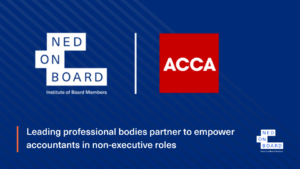The use of artificial intelligence (AI) is growing rapidly across the world, changing whole sectors, creating business opportunities and with the potential to drive economic growth and transform lives. It can, however, cause damage and harm to organisations using it and wider society so it has to be effectively controlled and managed by all organisations using AI.
Regulation lags behind the capabilities and use of technology and Governments will not be able to regulate every possible use of AI. Leaders must therefore take their own decisions, in the absence of regulatory guidance, on how they will use and control AI. Organisations of all types, the economy and wider society will all be harmed if leaders do not have the knowledge and structures to ensure AI is used with wisdom and integrity.
Findings of the AI survey
The 2022 AI Governance Report surveyed over 700 leaders (including NEDonBoard members) to find out how ready they are to control the use of AI in their organisations and ensure these new tools and technologies are broadly beneficial.
- 58% of organisations either have no AI expertise on their Boards or do not know what proficiency they may have. This is worrying as, without knowledge of how to get the best out of AI whilst controlling the potential negative impacts, private, public and third sector organisations will be slower to identify and seize opportunities to use AI. In addition they will be more likely to make mistakes by not spotting potential problems with AI use;
- over 90% of organisations have no structures and processes in place to control the use of AI internally and in their supply chains;the more informed Board members are about AI, the more likely they are to recognise the potential risks and put mechanisms in place to control AI use. Yet even where Boards have some AI knowledge, only 18% have a structure to control AI use;
- 59% of Board members are not aware of what AI-related regulations are being considered whilst 26% would welcome regulations that provide a level playing field.
There are many examples of AI being used in ill-judged ways. A hiring algorithm was based on fake science when it purported to predict job candidates’ suitability based on their facial expressions; banks have charged higher interest rates to borrowers living in disadvantaged areas; a system to predict when it was safe to swim in the sea was accurate less than half the time—that’s worse than just flipping a coin.
Related post: Demystifying artificial intelligence for the board
Summary of recommendations
Skills
AI is increasingly being used in organisations, from AI products and services developed in-house to AI-powered tools often hidden inside other products. Leaders in all types of organisations need to invest in their skills and knowledge to seize the opportunities AI offers to make businesses and whole economies more efficient and competitive. Without this they will fail to understand the opportunities and threats of AI, and in turn the UK will not fully seize the opportunities AI offers.
Governments, regulators and business schools all have a key part to play in supporting and providing affordable courses to reskill the leaders of today and tomorrow.
Related post: What are the skills demanded by companies for their non-executive directors?
Structures
AI brings new areas to consider which require new ways of working. Structures are needed in every organisation using AI directly or through suppliers to understand and control AI use. Boards also need to involve a wide range of stakeholders and establish an informed, independent voice for assessing and commenting on opportunities and risks of AI use; without this they will struggle to harness enough diverse points of view to use AI wisely.
Investors
For sound due diligence reasons and social responsibility, investors should seek information on AI use and governance when making investment decisions.
AI regulation
Regulators need to provide clarity about their direction of travel. The Government should seek out common areas amongst the regulators on which a single set of regulations or legislation can be based to reduce the confusion for businesses of having to apply different regulatory regimes to essentially the same technology.
“Not my problem”
Too many leaders are unaware that AI is already all around them. When they challenge their employees to reduce hiring costs or procure a new phone system, the probability increases almost daily that they will bring AI into their organisation without knowing it.
It’s time for all leaders to realise that they cannot build a wall to keep AI out and that this is an issue for every leader.
Additional resources: The intersection and interplay of Artificial Intelligence and ESG
Written by Sue Turner OBE, Non-Exec & Exec Board member, AI & data governance & ethics specialist
Want to know more?
Upskill today and fill any knowledge gap you may have to secure your next NED appointment: sign-up to one of our training courses and qualify as a professional NED.
Join a professional body and institute, solely dedicated to non-executive directors and board members. Network with peers and invest in your ongoing professional development: join NEDonBoard, the Institute of Board Members.




